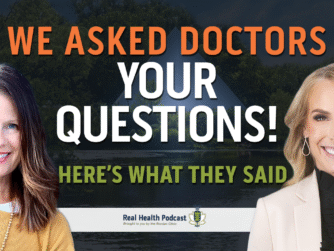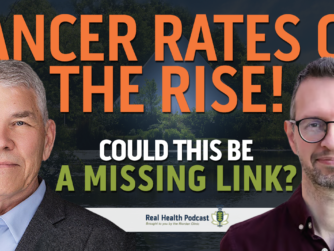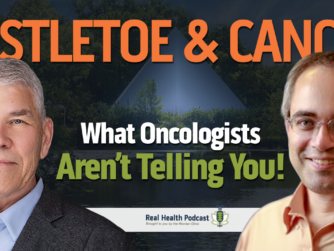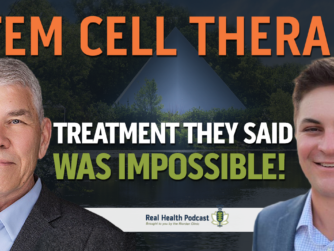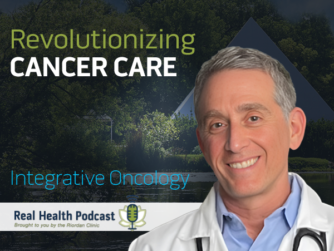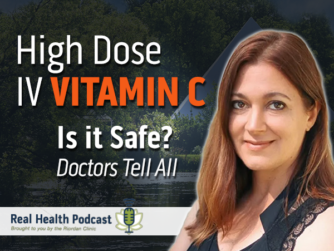In this episode, Leah Chischilly talks with Dr. Ron about complex chronic illness. Infections like Lyme disease, Epstein-Barr and now COVID-19 can have a lasting impact on a person’s health and life. Dr. Ron discusses his approach to complex chronic illness and how patients can prevent and recover from long-term health complications.
Thank You to This Episode’s Sponsor
Episode Transcripts
Intro: This is the real health podcast brought to you by Riordan clinic. Our mission is to bring you the latest information and top experts in functional and integrative medicine to help you make informed decisions on your path to real health.
Leah Chischilly: Welcome everybody to the real health podcast. My name is Leah Chischilly, and I am your host today. And I have Dr. Ron with me today. Hi, Dr. Ron.
Dr. Ron Hunninghake: Hello. Hello
Leah Chischilly: Welcome. Um, today we’re going to talk about something that we are very familiar with here at the Riordan clinic and that’s complex chronic illness, and the big reason why this is coming up, not just because it’s something that you’ve really specialized in for a number of years, but because we’re seeing this phenomenon that’s called long haul COVID or long COVID. And I want you to talk about some of the similarities that you’re seeing with that and some of the other things that you’ve dealt with throughout your career here at Riordan clinic. So tell me a little bit about what is long COVID?
Dr. Ron Hunninghake: Well, long COVID is where you survive the actual acute illness. Maybe you go in, maybe you don’t even make it into the hospital, but you get, uh, this really bad respiratory infection and you lose your smell and your taste doesn’t work, right? And, you’re really tired and your brain is all fogged out. And, after three or four days, you start to feel better and you think, Hey, I’m emerging out of the fog and this illness is lifting. Only to find out that weeks later, you can’t think as well, and you’re short of breath and you can’t sleep. And you’re just kind of nervous and kind of depressed. And, and you start to ache all over. And if you go in to see your doctor, the doctor says, Hey, what are you complaining about? You survived, yes, you had a positive COVID test, but you survived.
Dr. Ron Hunninghake: So, you know, just give it time, just give it time. And these people do give it time and they try to get extra rest and they don’t really know what else to do. Maybe do a little aerobic exercise, and that helps a little, but as time goes on, they’re not getting well. And this is a mild case of long haul COVID. The people that end up in the intensive care unit for weeks, and sometimes months. They are extremely debilitated. They can hardly walk, they have to have people help them. And so this is just a, a more extreme case of the complex chronic illness that follows the infectious disease. It’s where the infectious disease, kind of takes it all out of you. You, just don’t feel quite like you think you should. And this is not a new phenomenon. We’ve seen it for, for years with, post Epstein-Barr syndrome.
We think fibromyalgia oftentimes, ensues after a really severe, respiratory illness or flu like illness. There’s a number of these infections that just don’t quite go away. And, when patients go to see their doctors, it’s not that the doctors really aren’t listening. It’s just that they want to give it a diagnostic title, but there are no specific treatments, you know, antibiotics oftentimes don’t work. Uh, they can use things like, uh, pain medicines. They can, give antidepressants and these sorts of things, but they really don’t solve the underlying causes.
Leah Chischilly: And I have a couple of questions about it. In your research on long haul COVID, does it seem to affect people that had more serious cases or even mild cases or suffering from the long-term repercussions?
Dr. Ron Hunninghake: Well, obviously the people that have the really severe cases, it’s almost a sure bet that there’s going to be a very long recovery period, rehabilitation period. The people that have the mild cases, I’ve seen it go either way. People completely rebound. There’s no problem. They, uh, they’re over it and it’s done with, and I think that’s our experience when we have like the flu or something that. It’ll hold us down for a while, but we don’t suffer long-term repercussions at this point in time. I don’t know what the percentage is. I’m going to guess maybe 15 to 20% of people, uh, experienced some kind of long haul, response to COVID. And, so probably something similar to that in terms of these others. Lyme disease is a little bit of an exception. It seems like people who get Lyme disease, have a more serious long-term chronic illness that ensues – Lyme syndrome.
And so, it’s the thing I think is that it’s not so much what the disease was, whether it’s COVID or Lyme or Epstein-Barr, it’s how low were your reserves, to begin with. Someone who has not taken very good care of themselves that had developed a bad sugar habit may be to the point of pre-diabetes or even type two diabetes, someone whose weight has gotten away from them. And they’re heavy. They’re very heavy. Someone who doesn’t sleep very well. Or here’s a common one, they’re going through a major relationship, stress such as a divorce or someone very close dies, or there’s a conflict at work, or there’s some other kind of, uh, long drawn out relationship battle that just pulls the sap out of a person. And they just kind of lose their will to go to work and enjoy life and do what they need to do to take care of themselves.
These are all setups. And then you get the flu on top of that, which sounds like, Oh my gosh. And now the flu. Then the really bad thing is that flu takes you to a new level of low. And you’re just so deep down into all of these various debilitating symptoms that you just don’t feel like you can dig yourself out, and then people really do get depressed. I mean, so the doctor’s not wrong in saying, I think you’re depressed. It’s just that antidepressant medicine can kind of treat some of the symptoms of depression, but not the cause of depression.
Leah Chischilly: Absolutely. And getting to the root is always so key.
Dr. Ron Hunninghake: Well, I’m going to just tell you my background in this is, as a family physician, it’s not unusual at all for us to run into people who are chronically tired or chronically depressed, or people that have severe chronic allergies or another manifestation of allergies and a deeper one would be a long-term auto-immune disease.
These are all, in some ways, long-haul symptoms as well. We don’t think of them in that context, but oftentimes people who, uh, are afflicted with stuff like this. Once again, sometimes it’s the family, you say, was there a family history? Yes, my mom and my dad and some of my siblings had this, but we all grew up, and we all smoke or stay up late and party a lot. Or we always have these anger episodes, and we’re always getting into fights with people. So, many times It’s not a genetic thing. It’s a behavioral pattern that you have developed within your family. You know, it’s funny, growing up in our family of origin is the world. We think that the way we did it in our family is the way that everyone lives their life, but that’s not true.
There are families that have better behavior patterns, better sleep patterns. Maybe they are less exposed to toxins. Certain farm families that do a lot of spraying or do a lot of welding have a toxic exposure that another person doesn’t have. Some people are really into athletics, and some families are not into athletics at all. And so with that lack of exercise, that actually is a predisposition to chronic illness. So the challenge of seeing patients here at the Riordan clinic is taking inventory of these different facets of their lifestyle, looking at some hidden issues that most people don’t even think about, such as dental infections. Dental infections are hidden, and yet they can smolder within a person’s system. And these are the cause of a lot of chronic illnesses as well.
They’re not readily understood by most doctors, not even most dentists, but in the field of integrative medicine. We’re learning that the quality of health of your mouth has a lot to do with your overall health. And I’m always reminded of that old saying, you know, don’t look a gift horse in the mouth. My grandfather on my dad’s side was a horse trader. And that was a really quick way for a horse trader to check out how healthy was the horse he was getting ready to buy. He would look in the mouth, and the gums didn’t look good, or teeth were rotting or certain other aspects of the appearance of the tongue.
You know, there is a division of Chinese medicine called tongue diagnosis that the quality of your tongue may be a reflection of the quality of your overall healthy reserve. So all of these factors play into a holistic evaluation of chronic illness and chronic complex health.
Leah Chischilly: So maybe we’re looking at that. The problem isn’t necessarily COVID; it’s more of what’s already going on with that person, or is it possible that it’s something they already have some other sort of infection and then this COVID is triggering it.
Dr. Ron Hunninghake: All of these variables that I’ve just talked about can be existing. And, let’s, let’s take another example that I think is very relevant to the whole COVID story. Uh, we know that people have dark-skinned nationality. They seem to have a higher predilection for a more complex, difficult case of COVID. And, of course, a higher death rate as well. And it’s, it’s not because of inferior care. I mean, it could be that, but that’s not the main reason. The main reason I believe is that if you have darker skin, for example, African-Americans require eight times the amount of sunshine to get the same level of vitamin D in their blood. So very often, these patients have a vitamin D deficiency, and you say, well, what does that have to do with their susceptibility to illness?
Well, I encourage everyone that’s listening to at some point go onto the internet and type in vitamin D Wiki, just as one long word, vitamin D Wiki. It’s an encyclopedia of vitamin D research. And down the left-hand column of the first page, there are 125 medical conditions, health conditions that are related to vitamin D deficiency. Taking and having adequate amounts of vitamin D will reduce your susceptibility, reduce your likelihood of getting that illness and improve your likelihood of getting over that illness if you restore adequate vitamin D reserves. And so vitamin D insufficiency can be a huge cause of chronic, COVID, and other chronic illnesses. If that’s not measured for and not corrected adequately, then you may treat the symptoms. And once again, it’s so hard to treat a complex chronic illness because there are not one or two symptoms. There are 10, 20, 30, 50 symptoms. And people say, Wow, 50 symptoms! But it’s a little this and little that just doesn’t seem to get better.
So, uh, vitamin D is a very good illustration of this, but you can pick zinc deficiency. You can pick omega-3 fatty acids; there’s a predilection towards inflammation. You can pick, of course, vitamin C, people walking around, and scurvy. They’re tired, their gums bleed, and they’re depressed. Their immune system is not as good. So that brings us back to probably the core issues that when you have poor nutrient reserves, hormonal imbalances, toxicities within your body, stressors, chronic inflammation, autoimmune, your immune system doesn’t work as well. So that’s why you got this COVID or whatever the chronic illnesses. And then, because that’s why you got it. If you don’t correct that, it’s going to make it harder for you to get over it. So this is what leads to chronic COVID long haulers or chronic Epstein-Barr all the various chronic post-infectious disease syndromes.
Ad: There’s a lot more to this conversation and it’s coming up right after the break
Today’s podcast is brought to you by LivOn labs. Makers of lyposomal vitamins and supplements. LivOn uses a lyposomal encapsulation technology to protect nutrients from destruction in the digestive system. This allows for more efficient delivery of essential vitamins and nutrients. Choose from various supplements that support health and wellbeing such as lypshperic vitamin C, magnesium, glutathione, and more. To learn more visit LivOn labs. That’s L I V O N labs.com.
Leah Chischilly: I think it’s important to share with our listeners kind of maybe some stories, if you could, in your past with patients who have come in with countless symptoms, debilitating things that’s heavily impacting their life and can they get past it, like, are these things that are treatable and can we help?
Dr. Ron Hunninghake: And so, because I’ve been here at the Riordan Clinic and worked under Dr. Riordan for probably about 15 years before he passed, that was the name of the game. What can we do? But a lot of times, people want to jump into treatment first. And so Dr. Riordan’s idea was that you have to do the testing. You have to take a very thorough history and make a comprehensive assessment of where we need to put our attention. So rather than going in and getting a diagnosis and getting a prescription for that particular diagnosis, we’re more about taking time to really understand the patient as a whole person, looking at the context of their illness, looking at lifestyle issues, using our laboratory to measure and, uh, quantify where they’re strong and nutritional support and where they have weaknesses. And then, after we get all that data, we start to put together a treatment plan.
Now we are famous for intravenous vitamin C, and intravenous vitamin C, of course, relieves scurvy. And that’s just one nutrient deficiency. It could also be vitamin C and bioflavonoids. Bioflavonoids are important. And this is why a diet rich in colorful fruits and vegetables is an important part of healing, any healing program. And a lot of patients who get chronically ill are not getting enough. You know, we talk about five, a day of the colorful fruits and vegetables. If you’ve been ill, it may take 10 a day, and you want to get the highest quality you can if you can afford it. And so, this is why the treatment plan is not dependent upon one modality, such as vitamin C. I’ve had people come in and say, well, just give me the vitamin C and let me see if that works. I say, okay, we can do that, but you know, we’re being a bit myopic here. We’re just looking at the disease as if it were due to one deficiency, but the fact is that there are multiple areas of deficiency or imbalance and dysfunction that give rise to complex chronic illness. That’s why we oftentimes use that term. And that’s why your average doctor, who’s got 10, five, 10 minutes to see you, isn’t in a position to do this very thorough history, and to think about what are the various facets of this chronic illness, and then begin systematically correcting these with lifestyle modalities, nutritional supplements, strategies to improve your quality of sleep, getting some regular exercise, stress management, a relationship resolution. If there’s a big issue, all these things together can make for a healing process that takes time, but then you have built a foundation for long-lasting health.
Leah Chischilly: Yes, absolutely. And that’s so important now across the board, are there any real strict commonalities that you see with complex chronic illnesses, or is it pretty different for different people?
Dr. Ron Hunninghake: Well, we know that there’s a lot of genetic diversity that comes in into our office, and in the last 10 years, I’ve been really impressed with this concept of, uh, of what’s called MTHFR methylation disorders. And this, uh, affects about 70% of Americans. Uh, some people have, uh, two of the MTHFR genes from both parents and, uh, or, or maybe one of, of the, of the genes from both parents. And this can cause a 70 to 80% dysfunction in that methylation pathway. They, they are unable to, to pass a methyl group, which is a carbon plus three hydrogens over two other molecules in order to create certain, uh, nutrient, well, not nutrients, but, uh, enzymes and, uh, neuro-transmitters energy molecules, glutathione, which is a detoxifier and immune booster and antioxidant, uh, your DNA repair molecules, all of these depend upon adequate methylation.
So very often when I see a patient that’s just not getting better, we’ll do, uh, a nutrition genome test on them to find out what the status is of some of these, uh, these, these snips, there are a type of mutation that if you’re living really helpfully, they won’t necessarily cause you any trouble, but if you get sick and or you or your, your lifestyle habits, uh, become much worse, uh, and you deplete your, your reserves, then these mutations will kind of like emerge as being huge factors in why you can’t get over it. So that’s another new facet in the last 10 years that we have found can be a huge step in helping people emerge from their chronic illness.
Leah Chischilly: Now, coming from a consumer standpoint, it’s a lot to take in, MTHFR, eating better, exercising, you know, is it a parasite? Is it a virus? Is it all these things? And so there’s so many different things that we think can be causing the problem that we’re having. Where does a person even start?
Dr. Ron Hunninghake: When I was in my family practice training at Wesley hospital, I was the beneficiary of Dr. Gail Steven’s philosophy, who was the founder of that particular program. He personally believed that the doctor-patient relationship, and it’s not just the doctor, the healthcare provider/patient relationship, was in many ways the Cardinal foundation of helping people get well. Uh, and Dr. Riordan summarized that in one word – co-learning. So that way, I don’t treat every chronically ill patient the same. I try to really get to know them to develop a therapeutic friendship where they trust me, and I’m working with them as a unique person and that kind of healing relationship where people have confidence that we’re really working to get all these variables elucidated and corrected and get everything working again. That is a true foundation on which we can do all the rest of this and not make it so complicated that the patient says I’m lost; this is too much for me to figure out. We try to take it a step at a time. And fortunately, we have a tremendous nursing staff here. We have a team mentality where the educational stuff that we do, the nutritional, explanations, We give people all of this. We try to integrate into a program that’s doable; even though it may take some time, we’re there with our patients, helping them find their way through the dense fog of chronic complex illness.
Leah Chischilly: Yeah. I think that it’s so important to have someone who’s by your side the entire time. You know, we think that we’re going to save ourselves money by going to the internet and trying to figure out all this stuff on our own when really just throwing darts and throwing spaghetti at the wall, hoping that something sticks ends up costing more, I think, in the long run than it does just to find a provider that’s going to help you on your path back to wellness.
Ron Hunninghake:: Dr. Riordan actually was a forerunner to the internet and welcomed it because he thought this was a chance for patients to get better educated and to become a partner in the discovery process of determining just what are the key factors that are keeping me from getting well. But he felt that that partnership that I was talking about worked better than people just doing this on their own. But it takes the right kind of attitude on the part of the healthcare provider. The healthcare provider has to be open to the fact that there’s a pace at which patients can take all this in and digest it and start making those changes. Those therapeutic changes that are necessary for the recovery process to occur in an appropriate timeframe.
Leah Chischilly: Yeah. And I would imagine everybody’s pace is a little bit different.
Dr. Ron Hunninghake: Yeah. I mean, there are some people, it may be a year. I mean, I don’t want to be discouraging to people out there, but, you know, healing is not a quick fix type of thing. Healing involves not only the biochemistry of the cell, but it also involves the change in behaviors, better habits, sleep, even taking nutritional supplements; they’re not drugs. And so, when you start taking vitamin C the first time, it may not solve your scurvy overnight. This methylation stuff that I was talking about a lot of times, we’ll tell people it’s going to take maybe a month or two of tweaking these methylation factors before you’ll know if you’ve got the right mix. And so that process just needs to go on over various periods of time, depending upon how debilitated and depleted the patient became in the course of their infectious illness.
Leah Chischilly: Yeah. And I can speak from my own experience. When I was a patient here a couple of years back, I was not sick per se. I didn’t have anything that was going to kill me, or that was extremely debilitating, but I knew I didn’t feel good. And even in that state, even just being depleted enough, I’d say it took me at least a year to start feeling like myself again. And it took a lot of different things to get there. And I’m luckily able to do it without any sort of medication. Like it was all lifestyle and correcting nutrient deficiencies, but it does take time. So I can only imagine that someone suffering from something that is more serious, it’s going to be a long haul for lack of a better term.
Dr. Ron Hunninghake: Long haul COVID. Yeah. And, um, there’s another facet since we’re kind of just talking about all the various facets of healing that Dr. Riordan used to mention that people come in sometimes, and they’ve kind of almost given up on themselves. I mean, they’re frustrated. They think I’m just a sick person. And so that’s part of what I call self-concept. And one of the really neat things that can happen in there, one of my early patients, was a songwriter. And, uh, he came in depressed and tired and just everything that we were just now talking about and through the process of working with him and doing the testing and doing some IV vitamin C and encouraging him to make changes in his lifestyle. All of a sudden, one day, he kind of woke up, and he had this revelation I can heal because he had gotten to the point where he thought, no, I’m just stuck in this. There’s no way I’m ever going to get well.
And so he wrote a beautiful song entitled I can heal. That’s a self-concept that, Oh my gosh, I have it within me to actually get better because many of the people we see are in a state of despair and despondency, and their family sometimes has stopped believing in them. You know, it’s no fun to be a chronically ill patient. And it does put a burden on the family in a sense, and then people hate being a burden. They don’t want to be a burden. They don’t want to be sick. And then people begin to doubt and say, are you, are you really sick or are you, are you just kind of faking this? And you’re just not aware of it. And so then the patient begins to doubt themselves, am I really sick or what’s going on here?
So a lot of what we do is in the process of doing the nutrient testing and evaluating the various facets of chronic illness, and showing the test results to their family. We had one person who had a vitamin D level of six, and we’re shooting for like 60, 10 times that. And so really everyone should be, at least be more than 20, hopefully, more than 30 even. But ideally, we like them up in the 50, 60, 70 range. There’s much better sleep; there’s better immunity, there’s better inflammation regulation. Vitamin D and high levels help with autoimmune disease. So all these nutrients they aren’t get well quick types of things, but there are ways of bringing all the healing facets of the body back online when it’s been kind of offline or disconnected. And, when they start to reconnect, and people start exercising again, and then they start sleeping better, and they’re breathing properly, and they start deciding that I’d like to go back to work or their work becomes better. All these things are a process of healing, not a sudden miraculous fix.
Leah Chischilly: And unfortunately, I think sometimes that’s what we’re looking for is the fix. And instead of the patience that it takes to really do, but it’s a huge learning process too. I think there’s so much personal growth that comes along in healing that you almost, you wouldn’t want when, when it’s all said and done, of course, like, I don’t think that you would have gotten the growth or the life experience through the quicker fix.
Dr. Ron Hunninghake: It’s a, it’s a healing attitude that you have to assume. And this is part of that self-concept, you know, I can heal, I’m a patient, but I’m patiently waiting to, or patiently engaged in multiple fronts of trying to improve my health and wellbeing and be an active co-learner in a healing process.
Leah Chischilly: Yeah. That’s wonderful. Well, I think we’re going to end it on that note. Cause I think it’s just a really powerful take-home message is that you can heal. If you find that you’ve got the symptoms of COVID or any long-term illness that symptoms are creeping up or they’re lingering, you don’t have to just suffer through it. You can heal.
Dr. Ron Hunninghake: That’s the message right there. Wonderful.
Leah Chischilly: Thanks Dr. Ron, we’ll talk to you soon.
Outro: Thank you for listening to the real health podcast. If you enjoy this episode, be sure to subscribe and leave us a review. You can also find all of the episodes and show notes over at realhealthpodcast.org. Also be sure to visit Riordan clinic.org, where you will find hundreds of videos and articles to help you create your own version of real health.


